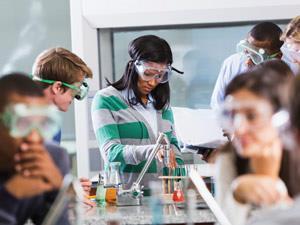How do students think about learning?

Chemistry undoubtedly remains a practical subject, but the true value of experimental work in terms of student learning is open to question. The lack of evidence regarding the merits of the undergraduate teaching laboratory have prompted some to question whether or not practical work is worth the time, effort and resources it consumes. In what is the latest in a series of papers outlining research into meaningful learning in the lab, Kelli Galloway and Stacey Lowery Bretz describe a qualitative study intended to characterise learning in a practical context.
In order to comprehensively capture their actions in the lab, students were issued with an action camera, which was worn over their ear, providing a first-person perspective on all aspects of their work during a practical session. Participating students then worked with the researchers to select video clips that captured key experiences during the session, such as ‘aha’ moments, occasions when they were confused and times when they understood what was going on. The students were then asked questions regarding their thoughts and feelings and the purpose of their actions during these clips, providing unprecedented insight regarding their experiences of practical work.
The authors present a wide range of quotes that will make fascinating reading for anyone interested in understanding what students really experience during practical work. Analysis of the responses led to some alarming findings, most notably that few students discussed learning chemical ideas in the lab, with some claiming not to have learned anything at all. Only a few students were able to explain the purpose of the different experimental steps and the chemical ideas used were typically inaccurate.
Such conclusions indicate that meaningful learning was extremely limited during these sessions and point to some key implications for teaching. Students need to be aware of the value of thinking about the steps in a procedure, but this requires metacognitive processes that are not natural to many. The authors suggest students should be asked to ‘explain as they go’ in order to check on their understanding and to promote the value of thinking about an experiment. The enhancement of metacognitive skills may help students to face up to the challenges of laboratory learning, particularly when they encounter the confusion and frustration that often occur during practical work.
References
K R Galloway and S L Bretz, Chem. Ed. Res. Pract., 2016, 17, 139 (DOI: 10.1039/c5rp00196j)









No comments yet